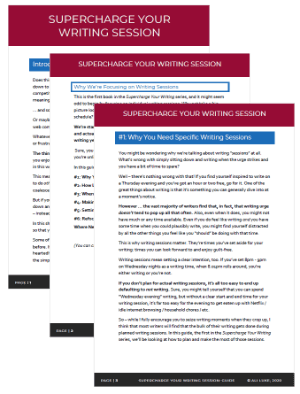How to Set Yourself Up For a Great Writing Day Tomorrow

Have you ended yet another day without any writing?
Maybe you had great intentions, but things just kept happening.
You woke up late. You had a busy morning at work. Colleagues were heading out for lunch, so you went along with them. You had to stop for groceries on the way home, then it was time to cook dinner and do laundry and handle all your other responsibilities…
… and writing just didn’t fit in anywhere.
Writing time doesn’t appear out of nowhere. It needs to be planned.
Planning to fit in any writing today might be a struggle, but how about tomorrow?
Spending just a few minutes planning ahead could open up the space to have a great writing day tomorrow.
Here’s how.
Step 1: Look at Your Calendar
Before you can plan any writing time, you need to know what tomorrow already looks like.
Do you have any meetings or appointments (including social events)? Are there crucial work deadlines you need to hit?
How much time could you comfortably spend writing?
A great writing day doesn’t need to mean writing for hours. It might mean one focused half-hour at lunchtime or in the evening. Repeat that most days, and you’ll soon be making serious progress.
Step 2: Set a Goal for Tomorrow
Now that you have a clear sense of how long you’ve got available for writing tomorrow, you can set a writing goal.
Your goal could be as simple as “write for an hour” or even just “write for 15 minutes”. Or you might prefer to set a word count or project goal, like:
- Write 500 words
- Come up with 10 short story ideas
- Outline 4 blog posts
Of course, if you have more time, by all means think big! You might want to set whole-day goals like:
- Write a chapter.
- Draft a 2,000 word short story.
- Write three blog posts.
Step 3: Make Physical Space for Your Writing
Finding space on your calendar is crucial – but you also need to make some physical space for your writing.
My minimum requirements for a suitable writing space are:
- A comfortable space to sit. You don’t want to end up getting a backache after 10 minutes of writing.
- A suitable place to rest a laptop (or paper notebook, if you prefer).
- No-one who might interrupt. If you have to write in a room that family members are also using, it helps if you can pick a corner or end of the room where you’re separated from other activities going on.
I almost always wear headphones when I’m writing. This helps create a little writing “bubble” where I’m not disturbed by external noise – whether that’s from neighbours, my kids, or just my desktop computer’s extremely noisy fan.
If it’s tricky to find space at home, then plan to write somewhere else. Could you head to a coffee shop or library? Could you write in the office at work, after working hours – or in your gym’s cafe, after a workout in the evening?
Step 4: Talk to Anyone Who Needs to Know About Your Plans
If you live on your own, or the people you live with are out for most of the day, your writing plans may not affect anyone but you.
If you have a partner, housemate, or anyone else sharing your home with you, then you may need to coordinate your writing plans with them.
Coordinating with other people is especially important if you’re a writer with children at home. In the Luke household, there are four of us: me, my husband, our 9-year-old daughter and our 7-year-old son. I can organise my time however I like during school hours – but if I want an interruption-free writing session outside those times, that means coordinating with my husband.
Even if you don’t have kids, you may still need to let other people know what your plans are. For instance, if you’re going to write from 7pm – 10pm tomorrow evening, your partner might like to know ahead of time so they can plan their own activities for the evening.
Step 5: Spend a Few Minutes Writing Down Your Thoughts About the Writing Session
Take a few minutes (five is enough!) to jot down your thoughts about your upcoming writing session.
By doing this the day before, your subconscious mind can get to work. You might find that ideas come to you while you’re having a shower or doing the dishes – and you’ll be more prepared to write.
It’s up to you what you want to write down ahead of time. Some good options are:
- A very quick outline for the piece you’re going to write
- Ideas that you want to incorporate into your work – either tomorrow or in general
- Techniques you could use if you find yourself distracted when you’re writing
- Tiny pieces of writing to incorporate into your work tomorrow (e.g. a line of dialogue or turn of phrase that you want to use)
… or anything else that you might find useful.
Make the Most of Your Writing Time With Supercharge Your Writing Session

Hopefully, the steps above will help you to have a great writing session tomorrow. But to really keep up the momentum and stay focused, check out Supercharge Your Writing Session.
This is the first guide in my Supercharge Your Writing series, though you can read these guides in any order. It’s focused and to the point, and comes with printable extras to help you get the most from your writing session – whether that’s short or long.
Supercharge Your Writing Session is just $8 and you can find out all about what’s included here.
Or, for the best value, you can pick up all four of the Supercharge guides for just $20 (saving $12 on buying them each individually). There are details about the full series here.
About

I’m Ali Luke, and I live in Leeds in the UK with my husband and two children.
Aliventures is where I help you master the art, craft and business of writing.
Start Here
If you're new, welcome! These posts are good ones to start with:
Can You Call Yourself a “Writer” if You’re Not Currently Writing?
The Three Stages of Editing (and Nine Handy Do-it-Yourself Tips)
My Novels

My contemporary fantasy trilogy is available from Amazon. The books follow on from one another, so read Lycopolis first.
You can buy them all from Amazon, or read them FREE in Kindle Unlimited.


0 Comments